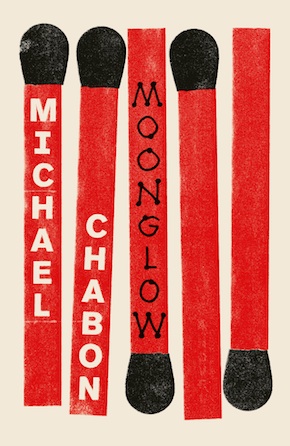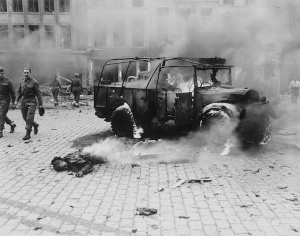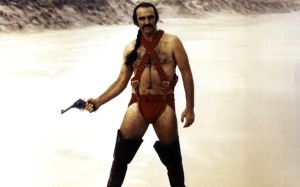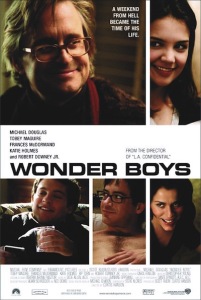Michael Chabon: Flying high
by Mark ReynoldsMichael Chabon’s latest novel Moonglow is a fake memoir that spans the Jewish slums of pre-war Philadelphia, rocket science and espionage in World War II Germany, the verve and machinations of the space race and the dwindling of the American Century in a sleepy Florida retirement home. It’s a comical, provocative, jubilant and tender saga about family secrets, storytelling and larger-than-life heroes. I chatted to him on the London leg of his book tour about the inspirations for the book, a mixed bag of movies, and a new essay collection about the Israeli Occupation he has edited with his wife, the novelist and essayist Ayelet Waldman.
The tone of Moonglow is set by a found 1958 advert from the Chabon Scientific Company for a fly-at-home rocket kit, accompanied by an author’s note from narrator ‘Mike Chabon’ pledging that all liberties with the truth “have been taken with due abandon”.
MR: Have you discovered whether any of your actual relatives were involved in the rocket kit company?
MC: No, I haven’t! I even met a few Chabons that I hadn’t met before in Cincinnati, when I was on the book tour, and we were able to figure out how we were related to each other but I asked them, thinking maybe it was their branch, and they didn’t know anything about it. So as yet it’s unresolved. One of the things I loved about that ad when I stumbled on it was, as anyone would, I immediately googled the Chabon Scientific Company and all I got, and all you would get if I hadn’t written this book were more images of the ad. So it’s kind of ungoogleable, in a very beautiful and rare way.
MR: Other sparks for the novel were the deathbed tales of your real grandfather, and a story about your great uncle, who lost his job to convicted Soviet spy Alger Hiss.
Not so much the tales that my grandfather told me, but the experience of being with him at the end of his life, and that he did reminisce, and that his mind did move really freely amongst the different rooms of his life, and the memory of that experience more than anything he actually said to me.
And you really do capture the abstract and disconnected way that people remember.
Yes, and there’s no thematic link. It’s a tricky narrative in a lot of ways, I guess, but it doesn’t pretend to be an in-the-moment recitation. It has a retrospective feel, it’s the narrator from a perspective of twenty years later, remembering the time when he sat as his grandfather’s bedside, so that what you’re getting is not a literal transcription. Clearly the narrator goes into much greater detail about things than the grandfather would ever have gone into, particularly personal, intimate things, like the sex life with the grandmother – which no one, no matter how many painkillers they were on, would ever be quite so detailed about.
So how did the various strands come together; the moon and the rockets, the lost job and the deathbed stories?
The story about my uncle came first, not exactly randomly. I was inspired by having just finished reading Denis Johnson’s Train Dreams, and by the little incident in that book where the main character when he’s a very old man sees Elvis Presley on a train in the 50s, and that conjunction of a big non-fictional public American historical narrative and this fictional, private, intimate, small narrative that also spanned American history in its own way. That made me start thinking about the story I’d heard, and how this big arc of American cultural history to do with Alger Hiss had briefly crossed the path of my family’s history when my poor uncle got sacked.
I realised I was in the realm of family stories and how they are shaped, and who tells what to whom, and how much of the truth actually survives into the future and the retelling.”
Then I very quickly bumped up against one of the biggest themes in the book. In trying to get any more details I could out of that uncle’s daughter and her daughter and my cousins, I emailed them, saying, “What do you remember about him being fired?” and my cousin wrote back and said, “I never heard that story.” Then her mother wrote back and said, “That’s not the way I heard it. I don’t think my father ever got fired from any job at all. He just came home from work one day and said, ‘You won’t believe who’s working in my business…’” So then I thought, well that’s weird, where did I get the idea that he got fired? I’m pretty sure my grandfather told me that. And then I asked my mother and she said, “Oh no, I remember he got fired from his job to make room for Alger Hiss,” and she’d heard it from her father. So that’s when I realised I was in the realm of family stories and how they are shaped, and who tells what to whom, and how much of the truth actually survives into the future and the retelling. And from there it was a short step to realising I was writing in the form of a memoir.
The moon came in through the title. I picked the title first, within just a couple of days of starting on the book. I’d been listening to big-band swing while writing The Amazing Adventures of Kavalier & Clay, and it was just a great way for me to get into the mood, and I thought, clearly I’m writing in the same sort of New York, mid-century vibe, I’m going to put some Benny Goodman on. And when that song ‘Moonglow’ came on, as soon as I heard it I had the feeling I wanted the book to evoke the same emotions this piece of music evokes in me, and in order to further that I’m going to call the book Moonglow. And then I started to write toward the title and the moon emerged in all different ways, one was through the Apollo programme and the moon landings.
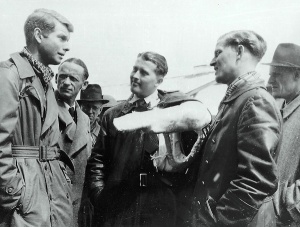
Wernher von Braun (centre, with cast) surrenders to US Army intelligence personnel in May 1945, with “a smile variously interpreted over the years as one of relief, high spirits, or a remarkable, even defiant smugness.”
Wernher von Braun looms very large in this as well, of course. He was a household name in America from the beginning of the space race. When did you first become aware of him, and at what point did you begin to doubt his hero status?
I first became aware of him through Walt Disney. Disney and von Braun were friends of a sort and they did a four-part series about man’s adventures in space. It was a very exciting, speculative programme and they showed all kinds of lunar cities of the future. I think they made it in the late 50s, but saw it when I was a kid in a programme called The Wonderful World of Disney. That’s where I first became aware of Wernher von Braun. Then the next thing I remember about him was hearing as a teenager that the character of Dr Strangelove had been based partly on von Braun; the idea of this sort of crypto-Nazi who can’t stop saluting Hitler. What everyone knew about him was he had been part of the German war machine and had developed the V2 rocket; but his version of the story was that he was not at all a Nazi sympathiser, he was purely interested in technical challenges.
Then I read Gravity’s Rainbow at graduate school, where the V2 rocket is essentially a character in the book, and that novel is full of factual information about that time in the rocket programme, really amazing stuff that only Thomas Pynchon had access to, because he worked at Boeing in the early 60s and the library had all this classified material about the programme. That’s when I became aware that there was this dark, much more Nazi past to Wernher von Braun than he wanted people to believe.
When I started there was part of me still willing to accept it was expedience at worst. And as I became more outraged, a lot of that outrage started to filter into my understanding of the character of the grandfather.”
So you, like the narrator, came across the New York Times article based on declassified documents about Operation Paperclip?
Yes, and there have been a number of books written since that really dig down into Operation Paperclip and into Braun and his sister – there’s a biography that I cite in one of the footnotes (Michael Neufeld’s Von Braun: Dreamer of Space, Engineer of War) – and the more I read, the more outraged I became. When I started writing this book I think there was part of me that was still willing to accept the idea that it was expedience at worst. And as I became more outraged, a lot of that outrage started to filter into my understanding of the character of the grandfather, his disappointment and disillusionment and rage and desire for revenge – all those things entered the book as I became more informed.
There’s a great description of the grandfather and his then sidekick Orland Buck preparing for war learning “mayhem and spycraft” under British officers who had “spent their lives subverting insurrections and infiltrating rebellions”. Would you say the US has since overtaken Britain in those dark arts?
Hmm, of necessity, I suppose, as Britain wisely disencumbered itself of that imperial wrongdoing for the most part. That was a transitional moment in many ways, as the transition from the British Empire to the American Empire was accomplished during the course of World War II.
You would’ve been 6 at the time of the first moon landing, and about 9 at the time of the last. What are your memories of watching TV broadcasts of the Apollo missions?
I can remember on the night of the moon landing being told, “OK, it’s not going to happen till later, so go to bed and we’ll wake you up.” I watched it with my grandparents and my parents, just as it happens in the book, and I remember just very groggily, having only been asleep for a couple of hours, stumbling out and watching this grainy, low-resolution black-and-white image on our lousy black-and-white television, and having the feeling, what am I even looking at? Where’s the moon, where’s the module? I had been very excited in the build-up to it all, I built cardboard models of the Lunar Rover and the Lunar Module, and in subsequent missions I always seemed to know who the astronauts were, and the nicknames for the craft involved. It was not unusual for kids at the time to be really into that stuff, and I was really into it.
And what about space-related films?
There was a kind of leap time for those movies in the 70s, between 2001 in 1968 and Star Wars in 1977. There were some pretty good dystopian movies like Planet of the Apes, The Omega Man and Solent Green, these dark visions of an overpopulated, dying earth, a post-nuclear holocaust, but in terms of space there were a lot of lousy movies. Dark Star, Silent Running, which was maybe the best post-2001 space-related movie for a while, but it really wasn’t that good. And Zardoz, that’s the one about a future where sex has ceased to exist, where Sean Connery spends the whole movie running around in a bright red loincloth, as this real barbarian who teaches all the women about pleasure. But Star Wars ushered in a much more interesting era. Soon after that we had Alien and Blade Runner, things got better after that.
Talking of movies, both Wonder Boys and The Mysteries of Pittsburgh have been filmed, and the Coen brothers began adapting The Yiddish Policemen’s Union.
They wrote a draft of a screenplay, that’s about as close as it got.
Such a shame that one got away.
Yeah, I was excited about it. I read their draft and it was clear they had really thought about some of the tricky storytelling issues the novel presented; they had to come up with solutions and they were very creative. And then nothing happened. A year or two went by, and my wife and I went to see their newest movie, A Serious Man, where the opening 14 minutes are entirely in Yiddish. I turned to my wife and said, “They’re not making it. No way are they going to make two movies like this. Whatever energy they had around Yiddishness went into this.” And so it turned out.
Wonder Boys I thought was a great film, but it’s considered a flop because it didn’t make its budget back.
Oh no, it did, actually. It didn’t cost that much, and it’s done really well over the years on video. Its post-theatrical life has been very good. It was considered a flop because nobody went to see it. Budget or no budget, it opened poorly and then it got a re-release and didn’t really do any better. What could’ve saved it is if it could’ve gotten some Oscar nominations outside of Bob Dylan’s for the song. If Michael Douglas had gotten the nomination that he deserved, it might’ve done better.
It’s fair to say you’ve had a mixed relationship with Hollywood. What other projects have you nearly seen get off the ground?
Well, Kavalier & Clay was much closer than The Yiddish Policemen’s Union ever was. We had an approved script, we had Natalie Portman, Jamie Bell and Tobey Maguire ready to star and Stephen Daldry was going to direct. Alex McDowell, the production designer, had taken his kids out of school in LA and enrolled them in school in London, because they were going to be shooting the interiors here, and then just at that last possible instant, Paramount pulled the plug. That was much more upsetting because I wrote the script and I’d been working on it for five years, after having worked on the novel for five years, so a lot of my life was tied up in that.
Any film interest in Moonglow?
There’ve been a few queries, nothing concrete.
Is it something you want to see happen?
I’ll be totally honest with you, I really don’t. I mean, it’s an extra paycheck, and I was happy with Wonder Boys, I think it’s a good movie, and if it brought new readers to the book because they saw the movie first, that’s wonderful. But, you know, I write the books – to be books.
I was interested to learn that you write only at night. Is that pretty much every day?
Yes, every day, until 3 or 4 in the morning. I try to get to at least 1,000 words a day. If it’s coming hard, I stop there, but if it’s going well I’ll push on and keep going and see how many I can rack up.
Together you and your wife have edited a collection of essays confronting 50 years of Israeli occupation of the West Bank and Gaza, with contributions from the likes of Geraldine Brooks, Dave Eggers, Eimear McBride, Colum McCann, Taiye Selasi, Madeleine Thien, Colm Tóibín and Mario Vargas Llosa. How did Kingdom of Olives and Ash come about, and what is the link with the NGO Breaking the Silence?
Ayelet was born in Israel, in Jerusalem, she lived there till she was two and went back many times during the course of her early life. She lived there twice after that, for a year and then six months, and she still has close ties and lots of friends and family there. When we first met and started going out, we took a trip. We went to Europe but we also went to Israel. She said, “If you want to know me, you really have to know Israel too, it’s a part of who I am.” So we went to Israel and I had a good time, I really liked it there. But she immediately had mixed feelings. She has a kind of love-hate relationship with the country and the people, it’s very Israeli to have that. And we didn’t go back.
If you love and support Israel, and you want Israel to continue to exist, you have to oppose the Occupation, not the reverse. By supporting the Occupation you are actually working to destroy Israel.”
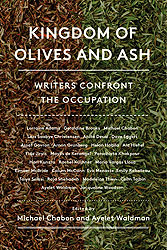 Then she got invited to attend the Jerusalem Writers Festival in 2014. She went, by herself, and she was surprised at how much she felt at home there – she speaks fluent Hebrew – but she was uneasy about the Occupation and she said to herself, “Look, I can’t just go back and ignore this.” We had met people who work for Breaking the Silence in the States when they came through Brooklyn, and she reached out to them while she was in Israel. They took her to Hebron, and she was so devastated and appalled by what she saw that she came home from that trip and she said, “I want to embrace Israel and my Israeli heritage, and I won’t be able to do that unless I do something to stop the Occupation.” They go together: the idea being that if you love and support Israel, and you want Israel to continue to exist, you have to oppose the Occupation, not the reverse. By supporting the Occupation you are actually working to destroy Israel.
Then she got invited to attend the Jerusalem Writers Festival in 2014. She went, by herself, and she was surprised at how much she felt at home there – she speaks fluent Hebrew – but she was uneasy about the Occupation and she said to herself, “Look, I can’t just go back and ignore this.” We had met people who work for Breaking the Silence in the States when they came through Brooklyn, and she reached out to them while she was in Israel. They took her to Hebron, and she was so devastated and appalled by what she saw that she came home from that trip and she said, “I want to embrace Israel and my Israeli heritage, and I won’t be able to do that unless I do something to stop the Occupation.” They go together: the idea being that if you love and support Israel, and you want Israel to continue to exist, you have to oppose the Occupation, not the reverse. By supporting the Occupation you are actually working to destroy Israel.
So I got right onboard and we just thought, so what can we actually do? Well, we know a lot of writers, or how to get to them, so she had the idea that we’d assemble a big group of writers from all around the world, from every part of the political spectrum, Muslim, Jewish, Israelis, Palestinians, Europeans, Asians, Africans, writers from every continent, and they went over in little groups and were taken on a full tour of the West Bank by Breaking the Silence: cities from Ramallah to Hebron to deep rural areas and refugee camps. All the writers got the full sweep of the Occupation, the geography of it and the politics behind the line drawing, and then each one was asked to focus in on any aspect of what they had seen. So for example there’s a writer who met a Palestinian hip-hop artist and she wrote about that; there’s an Israeli writer who’s a big soccer fan, and he wrote about Palestinian football, and Geraldine Brooks was interested in military legal justice and wrote about a case working its way through the system. We’re planning a launch in Palestine, a regular American-style bookstore event in Ramallah or someplace, and there’ll be events all over the US and here too, I believe.
What have you read lately that you particularly admire?
I just read an advance copy of Mohsin Hamid’s new book, Exit West, and it’s a masterpiece. It really reminded me of reading Waiting for the Barbarians for the first time, and a little bit of Ursula K. Le Guin too. It stretches the boundaries of the real just enough to start to make a really amazing point about the state of immigrants and refugees in the contemporary world. But it’s very much grounded in reality. It’s a beautiful book.
Finally, if you were offered a free ride on Virgin Galactic’s inaugural space flight, would you go?
How safe is it? In principle, I would love to. If space flight gets to the point that it’s like jet travel, I’m definitely there. While intellectually I completely understand the arguments people make that wasting time and money on colonising Mars, or moon bases and so on, doesn’t make sense when there are so many problems here on earth that need to be addressed. I get that argument, in a way I think it’s correct, but I do not feel it at all. What I feel is that of course we should continue to expand outward and have a human presence on the next planet over if we can. The interesting thing is it’s starting to seem at least possible that we simply can’t, that there are too many adverse effects on the human body. Apparently a really high percentage of all the people who have ever been in space suffer from chronic health problems that would not be typical in someone their age otherwise. So there are limitations to do with human lifespan, and it may just be we actually can’t get very far. But it doesn’t mean we shouldn’t try.
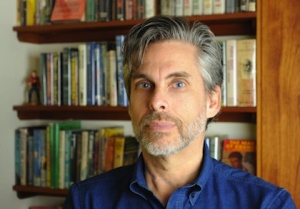 Michael Chabon is the author of the novels The Mysteries of Pittsburgh, Wonder Boys, the Pulitzer Prize-winning The Amazing Adventures of Kavalier & Clay, The Yiddish Policemen’s Union and Telegraph Avenue, the story collections A Model World and Werewolves in their Youth, and the non-fiction books Maps and Legends and Manhood for Amateurs. His short stories have appeared in the New Yorker, GQ, Esquire and Playboy. He lives in Berkeley, California.
Michael Chabon is the author of the novels The Mysteries of Pittsburgh, Wonder Boys, the Pulitzer Prize-winning The Amazing Adventures of Kavalier & Clay, The Yiddish Policemen’s Union and Telegraph Avenue, the story collections A Model World and Werewolves in their Youth, and the non-fiction books Maps and Legends and Manhood for Amateurs. His short stories have appeared in the New Yorker, GQ, Esquire and Playboy. He lives in Berkeley, California.
Read more
4thestate.co.uk/author/michael-chabon
Author portrait © Benjamin Tice Smith
Mark Reynolds is a freelance editor and writer, and a founding editor of Bookanista.
@bookanista

